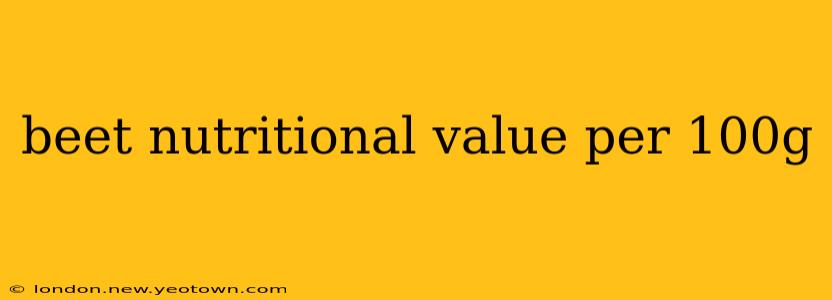Beets, or beetroot as they're often called, are more than just a vibrant addition to salads and soups. These earthy root vegetables boast a surprisingly impressive nutritional profile, offering a range of health benefits. Let's delve into the nutritional value of 100g of beetroot and uncover why this humble vegetable deserves a prominent place in your diet.
What is the Nutritional Value of 100g of Beetroot?
A 100g serving of raw beetroot provides a remarkable array of nutrients. It’s a good source of dietary fiber, essential for a healthy digestive system, and boasts impressive levels of several vitamins and minerals. Specifically, you can expect to find:
- Vitamins: Significant amounts of folate (vitamin B9), crucial for cell growth and development, alongside smaller amounts of vitamin C (an antioxidant) and other B vitamins.
- Minerals: Beetroot is a rich source of manganese, potassium, and iron. Manganese aids in bone health and metabolism, potassium supports healthy blood pressure, and iron is vital for red blood cell production. It also contains smaller amounts of other minerals like magnesium and phosphorus.
- Fiber: Beetroot provides a decent amount of dietary fiber, contributing to satiety and regularity.
- Nitrates: This is perhaps the most talked-about component of beetroot. Naturally occurring nitrates are converted to nitrites in the body, which can improve blood flow and athletic performance. More on this below.
- Antioxidants: Beetroot contains various antioxidants, including betalains, which contribute to its vibrant color and may offer protective effects against cell damage.
What are the health benefits of beetroot?
The impressive nutritional profile of beetroot translates into a range of potential health benefits:
Improved Blood Pressure:
Beetroot's nitrate content is often cited for its ability to lower blood pressure. The nitrates convert to nitrites, which relax blood vessels, improving blood flow and reducing pressure on the heart. This can be particularly beneficial for individuals with hypertension.
Enhanced Athletic Performance:
The improved blood flow brought about by nitrates can also enhance athletic performance. Studies have shown that beetroot juice can increase endurance and reduce the oxygen cost of exercise.
Reduced Inflammation:
The antioxidants in beetroot, particularly betalains, may help reduce inflammation throughout the body. Chronic inflammation is linked to various health problems, so this anti-inflammatory potential is a significant benefit.
Improved Digestive Health:
The fiber content in beetroot promotes healthy digestion, preventing constipation and supporting a healthy gut microbiome.
How many calories are in 100g of beetroot?
A 100g serving of raw beetroot contains approximately 43 calories. This makes it a relatively low-calorie food, ideal for incorporating into a weight-management diet.
Are there any downsides to eating beetroot?
While generally safe, some individuals may experience digestive discomfort such as gas or bloating after consuming beetroot, especially in large quantities. Beeturia, a harmless condition causing reddish-pink urine, can also occur.
How can I incorporate more beetroot into my diet?
Beetroot is incredibly versatile. You can enjoy it raw in salads, roasted as a side dish, pickled, juiced, or even added to smoothies. Experiment with different preparation methods to find your favorites!
Is beetroot good for weight loss?
Because of its low calorie count and high fiber content, beetroot can contribute to a healthy weight management plan. The fiber helps you feel full, reducing overall calorie intake. However, it’s important to remember that beetroot alone won't cause weight loss. A balanced diet and regular exercise are essential.
Is beetroot good for your skin?
The antioxidants in beetroot might contribute to healthier skin by protecting against cell damage caused by free radicals. While more research is needed, its potential anti-inflammatory properties could also benefit skin conditions.
This detailed exploration hopefully provides a comprehensive understanding of the nutritional value of 100g of beetroot and its numerous health benefits. Remember to always consult with a healthcare professional or registered dietitian before making significant dietary changes.

